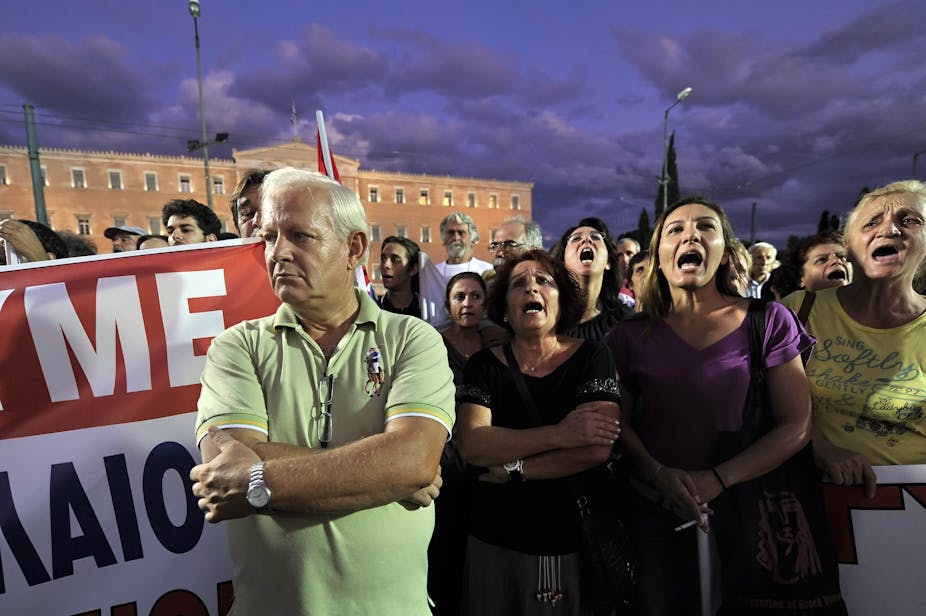Europe is in crisis once again and this time it is deadly serious.
At stake is not only the survival of the European currency, but also of the entire integration project. Collapse of the Euro could trigger a spiral of events beyond anybody’s control.
A fury of mutual accusations, retaliations, and recriminations would be likely to follow generating conflicts and chaos. Germany would be the most prominent suspect in the ensuing blame game.
Commentators already write about the Fourth Reich. Since chaos is a heaven for populist politics, nationalism would thrive.
The politics of territorial claims and financial recriminations would ensue. In 1997, the American economist, Martin Feldstein warned that the creation of the European Monetary Union would be likely lead to war in due time.
Was he right perhaps?
In crisis, opportunity?
Europe’s political leaders may well be slow, stubborn, and ineffective, but they do not need to lose control over the rapidly evolving history.
In fact, the history of European integration shows that crises may well generate a sense of common purpose necessary for new cooperative initiatives.
For instance, the Balkan crisis is said to have made France and Great Britain create the St. Malo framework for Europe’s common defence, while 9/11 motivated Europe to further integrate in the field of Justice and Home Affairs.
The current financial crisis has also mobilised Europe’s leaders to get serious about the creation of European economic governance. And so the President of the European Commission, José Manuel Barroso, has recently declared: “I believe that, with courage and wisdom, the European Union will – as was the case in the past – come out of the crisis stronger.”
Barroso’s optimism seems as excessive as Feldstein’s pessimism. Europe is not on the brink of war, but it would take more than courage and wisdom to overcome the current crisis.
New thinking to pay the bills
To start with, Europe needs to find a lot of money to service its huge debts and regain confidence in financial markets.
Money would also be needed to satisfy increasingly desperate electorates after years of sluggish growth and uneven distribution of profits.
Europe has always prided itself on having attractive social policies backed by an efficient public sector. Much of this is now in ruins after the era of neo-liberal economics.
However, money alone is not likely to get Europe out of this crisis. Europe needs to invent a new way of investing and distributing money.
In short, it needs to conceive and put in practice new paradigms of running their economies and societies. Europe needs its 21st century’s equivalents of Thomas Malthus, David Ricardo, Adam Smith, and John Stuart Mill.
It also needs a post-modern equivalent of Émile Durkheim and Max Weber. Those will not be easy to find in faculties of sociology and economics dominated by statisticians with little interest for the real world.
Breakdown in trust
The most serious manifestation of the current crisis is not the credit crunch, but the breakdown of the social contract.

Consider the present day Great Britain which, in a period of just three years, has experienced bankers’ excesses in Canary Wharf, youth excesses in Tottenham and Brixton, a parliamentary expenses scandal, and the News of the World scandal.
What kind of public trust and solidarity can one expect in a country with that sort of experience?
Or consider the present day Italy where the Prime Minister is busy chasing girls and fighting judges rather than overcoming his country’s economic crisis.
Even his media empire is unable to create a feeling of a genuine social contract. And can one envisage any pan-European social contract without a coherent European public sphere and cross-border solidarity?
Today some Europeans hope that China will solve their immediate financial needs. China may well do that, but will China offer Europeans a way to rebuild social contract?
Will China propose a paradigm for a new European version of capitalism and democracy? Will China suggest a workable governance system to effectively run 27 proud member states?
These things would have to come from Europeans and nobody else can help them in this respect.

